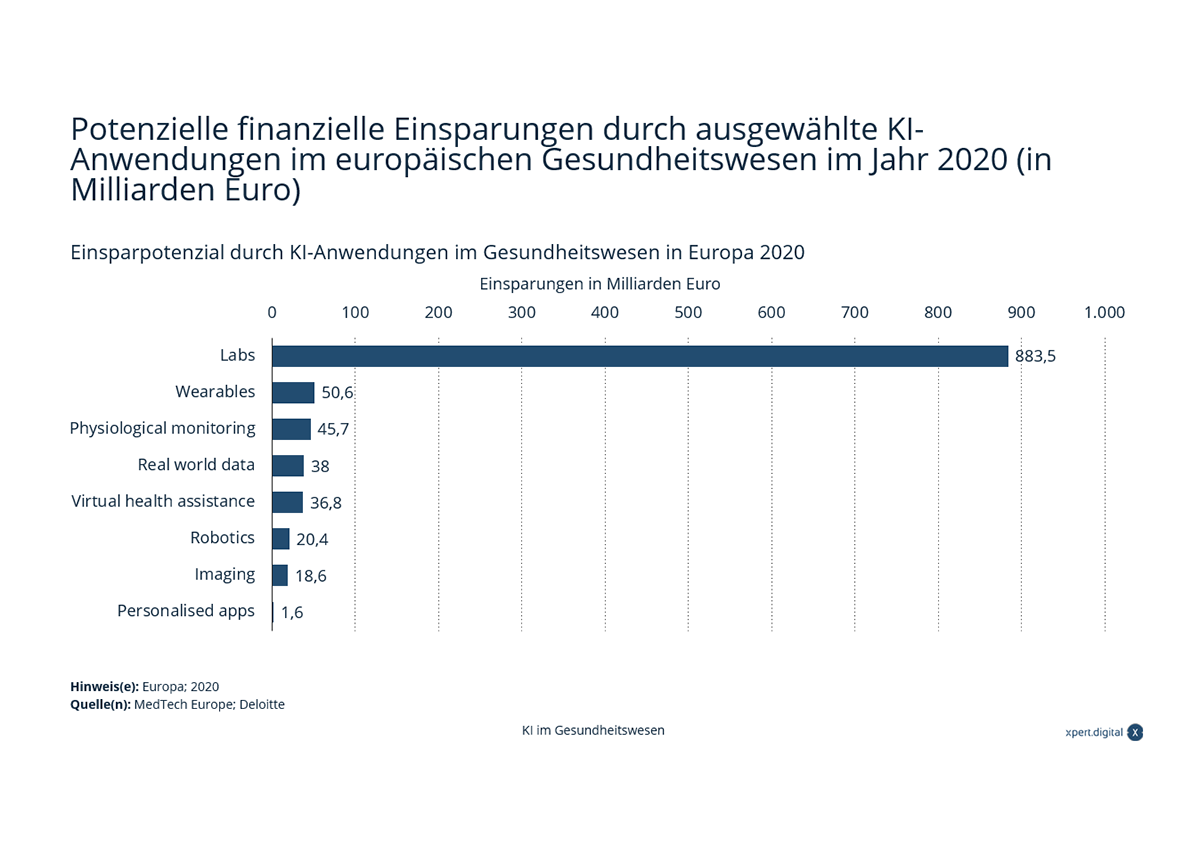
Potential financial savings through selected AI applications in the European healthcare system in billions of euros – Image: Xpert.Digital
💡 Artificial intelligence in healthcare
🌟 Artificial intelligence (AI) has the potential to fundamentally and sustainably change healthcare in Europe. The implementation of AI technologies in various areas of healthcare can not only improve the efficiency and accuracy of medical care, but also provide significant financial savings. According to a study by MedTech Europe and Deloitte, the potential financial savings from selected AI applications in the European healthcare system amount to over 1 trillion euros.
🌍 Overview of savings potential
1. Laboratory diagnostics 🧪
Laboratory diagnostics is one of the areas with the highest savings potential through the use of AI. Automating and improving diagnostic processes through AI applications can increase efficiency and reduce errors. According to the study, the savings potential in this area was an impressive 883.5 billion euros.
2. Wearables ⌚️
Wearable technologies equipped with AI enable continuous monitoring of patients' health parameters. These technologies can detect early health problems and provide timely warnings, leading to a reduction in treatment costs. The savings potential through wearables was estimated at 50.6 billion euros.
3. Physiological monitoring 🚑
Continuous physiological monitoring through AI systems makes it possible to monitor vital parameters in real time and react immediately in the event of deviations. This can shorten hospital stays and avoid unnecessary medical procedures. The savings potential in this area was estimated at 45.7 billion euros.
4. Real-world data 📊
The use of real-world data (RWD) combined with AI can provide valuable insights into the effectiveness and safety of therapies. RWD can also help develop personalized treatment plans and increase healthcare efficiency. The savings potential through the use of RWD was estimated at 38 billion euros.
5. Virtual health assistants 🤖
Virtual health assistants powered by AI can support patients 24/7 by answering questions, assessing symptoms and making recommendations. These assistants relieve the burden on medical staff and reduce the costs of outpatient care. The savings potential in this area was estimated at 36.8 billion euros.
6. Robotics 🤖
The use of robots in surgery and other medical areas can increase the precision and efficiency of procedures. AI-controlled robots can also take on repetitive tasks and thus relieve the burden on staff. The savings potential through robotics was estimated at 20.4 billion euros.
7. Medical Imaging 🖼️
AI applications in medical imaging can improve the accuracy of diagnoses and reduce the workload of radiologists. Early detection of illnesses can reduce treatment costs. The savings potential in imaging was estimated at 18.6 billion euros.
8. Personalized apps 📱
Personalized health apps powered by AI can help patients better manage their health and take preventive measures. These apps can provide personalized recommendations and improve patient compliance. The savings potential through personalized apps was estimated at 1.6 billion euros.
🔍 Challenges and future prospects
Despite the impressive savings potential, there are challenges to implementing AI in healthcare. Privacy and security are important aspects that must be taken into account to gain patient trust. Furthermore, integrating AI into existing systems and processes is often complex and requires significant investments.
However, future prospects show that the continuous development of AI technologies and their integration into healthcare can lead to even greater savings and improvements in the quality of care in the long term. Collaborations between technology companies, healthcare providers and regulators are crucial to realizing the full potential of AI in healthcare.
🏁 Efficiency and quality of medical care
The use of AI in healthcare offers significant financial savings potential and can significantly improve the efficiency and quality of medical care. From laboratory diagnostics to wearables to virtual health assistants and robotics, the applications of AI are diverse and promising. Despite the existing challenges, the future prospects are positive, and with the right investments and regulations, AI can sustainably transform healthcare.
📣 Similar topics
- 🔬 Laboratory diagnostics: AI is revolutionizing testing
- 🤖 Robotics in healthcare: precision and efficiency
- 📱 Personalized health apps for better care
- 📊 Real-world data: Valuable insights through AI
- ⌚️ Wearables: Continuous monitoring through AI
- 🧠 Virtual Health Assistants: 24/7 support
- 🚑 Physiological monitoring: Real-time vital signs through AI
- 🔍 Imaging with AI: Early detection and accuracy
- 💡 Challenges of AI integration in healthcare
- 🌐 Financial savings through AI in Europe
#️⃣ Hashtags: #AIinHealthcare #SavingsthroughAI #DigitalHealthcare #FutureofMedicine #InnovationsinHealthcare
🎯🎯🎯 Benefit from Xpert.Digital's extensive, five-fold expertise in a comprehensive service package | BD, R&D, XR, PR & Digital Visibility Optimization
Benefit from Xpert.Digital's extensive, fivefold expertise in a comprehensive service package | R&D, XR, PR & Digital Visibility Optimization - Image: Xpert.Digital
Xpert.Digital has in-depth knowledge of various industries. This allows us to develop tailor-made strategies that are tailored precisely to the requirements and challenges of your specific market segment. By continually analyzing market trends and following industry developments, we can act with foresight and offer innovative solutions. Through the combination of experience and knowledge, we generate added value and give our customers a decisive competitive advantage.
More about it here:
🤖💉 The role of artificial intelligence in the healthcare industry
💡 Artificial intelligence (AI) has emerged in recent years as one of the most promising technologies that has the potential to fundamentally transform the healthcare industry. This transformation is being driven primarily by the increasing spread of digital health start-ups that are developing innovative solutions for a wide range of healthcare areas. This text highlights the current developments, challenges and potential of AI in the healthcare industry, based on the data and trends of 2020.
Distribution of the 150 most promising AI and digital health start-ups by segment – Image: Xpert.Digital
🔍 Overview of the AI start-up scene in healthcare
According to CB Insights 2020 data, the 150 most promising digital health startups are spread across different healthcare segments. The main areas include:
- Clinical Intelligence & Enablement (17%)
- Screening & Diagnostics (16%)
- Virtual Care Delivery (11%)
- Disease management & therapeutics (10%)
- Emergency care (7%)
- Drug development (7%)
- Automation & Digitalization (7%)
- Health Plans & Benefits Management (7%)
- Real-World Evidence (RWE) (7%)
- Special care (4%)
- Pharma supply chain (4%)
- Clinical trials (3%)
This distribution shows that AI-based solutions play a significant role, especially in the areas of clinical intelligence, diagnostics and virtual care.
🩺🧠 Application areas of AI in healthcare
Clinical Intelligence & Enablement
Clinical intelligence involves the use of AI to support clinical decisions. This can include analyzing patient data, identifying patterns and predicting disease progression. By integrating machine learning and big data analytics, physicians can make better-informed decisions, resulting in improved patient care.
Screening & Diagnostics
Another important field of application is screening and diagnostics. AI can be used here to detect diseases early and make more precise diagnoses. For example, algorithms are being developed that analyze radiological images and detect abnormalities that could indicate tumors or other diseases.
Virtual Care Delivery
Virtual care, enabled by telemedicine and remote monitoring, has received a huge boost from the COVID-19 pandemic. AI-powered platforms make it possible to monitor and treat patients remotely, significantly improving the accessibility and efficiency of healthcare.
Disease management & therapeutics
In the field of disease management and therapeutics, AI systems are used to develop personalized treatment plans. These systems analyze a variety of patient data to identify and tailor the most effective treatment options.
🚨❓ Challenges and ethical considerations
Despite the many benefits that AI offers in healthcare, there are also significant challenges and ethical concerns that must be considered.
Data protection and data safety
Protecting sensitive health information is of utmost importance. AI systems require large amounts of data to be effective, increasing the risk of data misuse and security breaches. It is essential to implement robust security protocols and privacy policies to protect patient data.
Bias and fairness
AI algorithms may contain biases that can lead to unfair or discriminatory results. This is particularly critical in healthcare, where such biases can impact the quality of care. It is important to continually monitor and improve algorithms to ensure they operate fairly and unbiased.
Accountability and transparency
The question of responsibility when using AI systems is complex. It must be clearly defined who is responsible if an AI system makes incorrect recommendations. In addition, the functioning of AI systems should be transparent so that medical staff can understand the decisions made by the algorithms and, if necessary, question them.
🔮✨ Future developments and innovations
The future of AI in healthcare is promising and will be characterized by continuous innovation. Some of the most promising developments include:
Personalized medicine
By combining AI and genomics, highly personalized treatment plans can be developed. AI systems analyze genetic data to identify specific therapeutic approaches tailored to patients' individual needs and genetic profiles.
Robotic surgery
Robot-assisted surgery is becoming increasingly precise and safer thanks to the integration of AI. AI systems help surgeons plan and perform complex procedures by analyzing real-time data and enabling precise movements.
Preventive healthcare
AI can also play an important role in preventive healthcare by identifying disease risk factors and suggesting preventive measures. This can help prevent disease early and improve the overall health of the population.
🤖🩺 Significantly improve the quality of care
Artificial intelligence has the potential to fundamentally transform the healthcare industry and significantly improve the quality of care. The diverse fields of application of AI, from clinical intelligence to diagnostics to virtual care, show the enormous potential of this technology. At the same time, however, the challenges and ethical concerns must be addressed to ensure the safe and fair use of AI in healthcare.
The continued development and integration of AI-based solutions will shape the future of healthcare and help patients worldwide receive better and more efficient care. The collaboration between researchers, doctors, technicians and politicians is crucial in order to fully exploit the advantages of AI while minimizing the risks.
📣 Similar topics
- 🤖 The healthcare industry revolution through AI
- 🔍 Precise diagnostics with artificial intelligence
- 🏥 Challenges and opportunities of AI in healthcare
- 📊 Start-ups and the future of digital health
- 🌐 Virtual care: Telemedicine and AI
- 🧠 Machine learning in clinical intelligence
- 🔒 Data protection and ethics when using AI
- 🩺 Personalized therapy thanks to artificial intelligence
- ⚙️ Automation and digitalization in medical technology
- 🤖 Robotic surgery: precision through AI
#️⃣ Hashtags: #ArtificialIntelligence #Healthcare #Diagnostics #Telemedicine #Data Protection
🏥🕶️ Real-World Evidence (RWE), Virtual Health Assistants and Diagnostics 4.0 – Is this the Healthcare Metaverse?
Digitalization permeates almost all areas of life and does not stop at the healthcare system. In this context, keywords such as real-world evidence (RWE), virtual health assistants and diagnostics 4.0 appear again and again. But what exactly is behind these terms and how do they fit together? Are they creating a “Healthcare Metaverse”?
More about it here:
We are there for you - advice - planning - implementation - project management
☑️ Industry expert, here with his own Xpert.Digital industry hub with over 2,500 specialist articles
I would be happy to serve as your personal advisor.
You can contact me by filling out the contact form below or simply call me on +49 89 89 674 804 (Munich) .
I'm looking forward to our joint project.
Xpert.Digital - Konrad Wolfenstein
Xpert.Digital is a hub for industry with a focus on digitalization, mechanical engineering, logistics/intralogistics and photovoltaics.
With our 360° business development solution, we support well-known companies from new business to after sales.
Market intelligence, smarketing, marketing automation, content development, PR, mail campaigns, personalized social media and lead nurturing are part of our digital tools.
You can find out more at: www.xpert.digital - www.xpert.solar - www.xpert.plus

